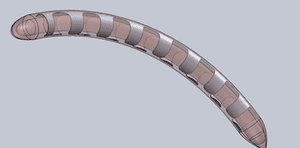January 6, 2017
Researchers funded by Boston Scientific made a penile implant that remains flaccid at body temperature but becomes erect with heat.
Amanda Pedersen

This nitinol implant is flaccid at body temperature ...

... but returns to an expanded shape when heated
Researchers have developed a heat-activated implant that could be the biggest breakthrough for erectile dysfunction since Viagra.
Medication for erectile dysfunction doesn't always work, and existing penile devices can be awkward to use. So Brian Le, of the University of Wisconsin-Madison, turned to a nickel-titanium allow that is well known in the device industry for its unique shape-memory and elastic properties.
Le, along with colleagues from Northwestern University and Southern Illinois University, used nitinol to design and prototype a heat-activated device that was able to rise to the occasion, so to speak, in mechanical testing. The researchers compared their device to commercially-available penile implants, including an inflatable prosthesis and a malleable prosthesis.
The shape-memory alloy device demonstrated "useful mechanical characteristics, including rigidity to buckling when activated," similar to the inflatable product, according to their paper, published in the journal Urology.
The nitinol device also became more pliable when deactivated within acceptable mechanical ranges of existing devices, Le and his colleagues reported. "It could be repeatedly cycled and generate a restorative force to become erect," they wrote.
The researchers concluded that their penile prosthesis represents a promising new technology in the treatment of erectile dysfunction, a condition that affects more than half of men over 40, to some degree.
Next Comes The Remote
While the invention is at least five to 10 years from commercialization, Le estimated, the device could potentially be surgically implanted and would remain flaccid at body temperature but able to "remember" an expanded shape, which it would return to when heated.
Le and collaborators at Southern Illinois University are currently working on a remote-control device that could be waved over the penis, using induction to heat the implant a few degrees above body temperature, just enough to ratchet open the alloy prosthesis to expand in length and girth.
The biggest advantage over existing devices, the researchers noted, is the potential to produce a simulated erection without a pump or reservoir. It also would not be permanently rigid like a malleable prosthesis.
Boston Scientific's Role
The research was funded, in part, by American Medical Systems Inc. (AMS), before Boston Scientific Corp. acquired the men's and prostate health businesses of AMS in 2015 in a deal valued at $1.65 billion.
"Boston Scientific supports research that advances medical and scientific knowledge related to products and relevant disease states across our many businesses," Catherine Brady, senior communications manager at the company, told Qmed.
Brady said the company has a global investigator sponsored research program that is open to submissions from researchers interested in conducting their own work in the field.
Boston Scientific offers three implantable penile prosthetics, two that are of the inflatable variety and one malleable device that can be bent downward for concealment, or positioned for an on-demand erection.
Amanda Pedersen is Qmed's news editor. Reach her at [email protected].
[Image credit: University of Wisconsin-Madison]
About the Author(s)
You May Also Like


